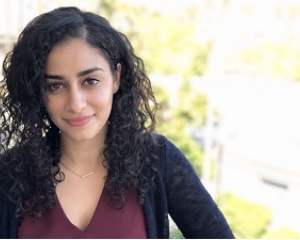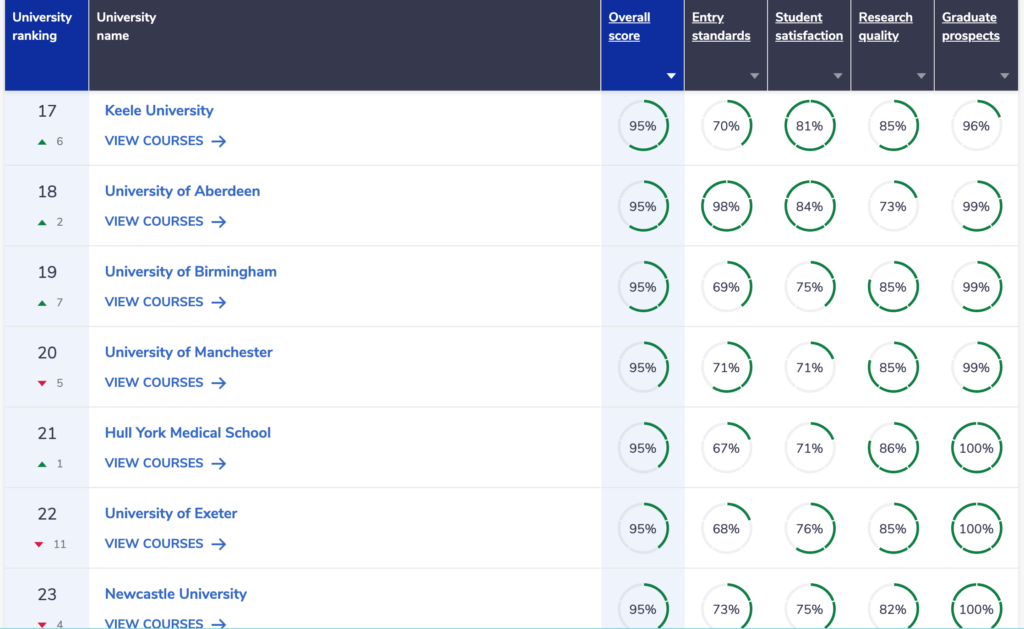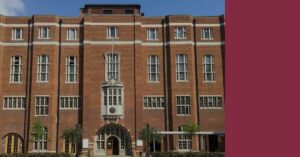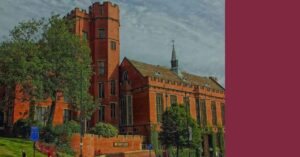Welcome to our UK Medical School Review series. In this series, we work with current students to produce an in-depth overview of each UK Medical School, covering what it is like to study there, how the course looks and what you need to get in.
Today, we are focussing on Manchester Medical School, a member of the Russell Group of UK research-intensive universities. Ella, a Manchester Medic, will share her experiences and insights as a current student throughout.
Let’s start with an overview of Manchester Medical School…
Overview Of Manchester Medical School
About Manchester Medical School
Manchester Medical School is one of the oldest Medical Schools in England. A Faculty of Medicine was ultimately established in 1873, after medical teaching began back in 1752, with medical degrees awarded by the Victoria University from 1883. The Medical School was extended multiple times due in later years to its success, including introductions of new departments such as Dentistry, and acceptance of medical students from the University of St. Andrews and International Medical University for their clinical studies.
Nowadays, the Medical School is the largest in the United Kingdom. It offers 2 Medicine courses, a standard 5-year Undergraduate course and a 6-year course with a foundation year, both culminating in the award of a MBChB (Bachelor of Medicine and Surgery) degree. Both a 5-year standard course and a 6-year course with a foundation year are offered for Dentistry.
Manchester Med School

- University Age: 151
- UK Ranking: 20th
- Pint Price: £4.00
- Alumni Notability: 9/10
- A-level Requirements: AAA
- Places Available: 397
- Applicant Success Rate: 34%
- Teaching Style: PBL
- Interview Style: MMI
- Admissions Test: UCAT
Manchester Medical School Alumni
Notable alumni from Manchester Medical School include Dame Sally Davies, Chief Medical Offer for England; John Charnley, a pioneer in hip replacement surgery; and Archibald Vivian Hill and Sir John Sulston, Nobel Prize winners.
Why did you choose to study at Manchester?
“I chose to study in Manchester for many reasons. Firstly, the city of Manchester is a fun and diverse place; there is so much to do and see in your spare time. It is also well connected by train to most other major cities in the UK (great for days out and seeing friends and family from back home). Manchester Medical School is PBL based and this was a positive selling point for me- I wanted the opportunity to be taught using a more flexible style of learning that reflected the way Doctors are taught. Having cases to frame learning around has also helped my understanding of how your basic biology links to real-life patients.
Also, my application interview for Manchester was extremely friendly and from this, I could tell that the staff were going to be very supportive and helpful. This was something that I really valued and have appreciated throughout my time here.”
What is the best thing and worst thing about your Medical School?
“The best thing about studying at Manchester Medical School is the people. The students and staff are friendly and enthusiastic and all the sessions you attend in your first two years (preclinical years) are fun and useful. The Medical School is one of the largest in the country which makes it easy to find people who are interested in the same things you are and you are never alone! Also, from first year, Manchester has a focus on helping you develop the skills you will need to be a good Doctor. They do this by organising placements in hospitals and GPs from your first semester and through weekly communication skills sessions. This focus is not seen so early on in all Medical Schools and is greatly useful as you move through your clinical placement years and become a junior doctor.
One potential drawback of Manchester is that in the final three years of your degree, you may be based in Preston for your clinical placements (this is 1.5 hours north of Manchester). Because of this, these students will move to Preston; some prospective students may find this off-putting as they want to stay in Manchester for their whole degree. It is worth noting that the teaching in Preston is very good, they have their own societies separate from the rest of the Medical School and most students enjoy their time there, but for some people, it is something to bear in mind.”
Medical School Rankings
The following link will take you to the Complete University Guide Medicine League Table. Here, you can see that Manchester Medical School takes 20th position with an overall score of 95%:
Rankings will, of course, differ between other tables; the Guardian includes different aspects to the Complete University Guide. When making your own decision on which table to look at, think about what you place more importance on, such as spending per student or career prospects. Keep in mind that all Medical Schools are highly ranked with excellent ratings across the board.
Manchester Medical School Fees And Financial Support
Annual tuition fees for home students are £9,250. For international students, it is £38,000 for Years 1 and 2 (Pre-Clinical), and £58,000 for Years 3-5 (Clinical). Tuition fee loans are offered to all UK students by the Government and cover the course fees in full. Fees do not have to be paid upfront. There are bursaries available at the University of Manchester and they have a solid Student Welfare and Professionalism Team who can provide support and advice.
What are the living costs like?
“Living in Manchester is relatively affordable and in your first year, you have plenty of time to balance a job with your University work if you need one- flexible job opportunities for students are very easily accessible near campus. There is a range of accommodation prices depending on the type of accommodation you wish to choose, the cheapest halls cost around £95 per week and more expensive halls will be priced around £160 per week.
The bus running past the halls and Medical School costs £1.50 for a single trip (although there are many good student offers on bus passes too). Nightlife is also affordable with many bars and clubs offering student discounts; the average price of a pint is central Manchester is £3.90 but many halls have their own bars which offer drinks much cheaper than this!”
Not sure where to start with your Medical School application?
Our Complete Bundle provides support for your Personal Statement, UCAT, BMAT and Interview and guides you to a successful application.
With our Complete Bundle, we guarantee that you will get at least one offer to study Medicine, or your money back.


What Is Studying At Manchester Medical School Like?
Years 1 and 2 at Manchester Medical School are considered Pre-Clinical. The main teaching format used is Problem-Based Learning (PBL). This involves theme-based discussions in small groups, with each theme correlating to what is being learnt in lectures and other practical classes. This allows students to be proactive in their learning and enhance their skills of communication and discussion. Anatomy sessions involve cadaveric dissection. Students will have the opportunity for clinical exposure in these years through community placements at a General Practice.
Years 3 to 5 are the Clinical years with clinical placements taking place at 4 base hospitals and their associated teaching hospitals, alongside further experience in primary care community settings. Placements are blended with online and face-to-face theme-cased discussions.

What is a week in first year like at Manchester Medical School?
“Monday morning would involve an hour and a half of PBL opening (reading the week’s case and creating the learning agenda) in a group of around 12 students. On Monday afternoon you could have a placement in a GP, extra lectures or private study.
On Tuesday and Wednesday, you would have three hours of lectures each day; these would relate to your PBL case and be focused on the biology of the disease, clinical aspects of the case or social elements of medicine. You may also have a session on pharmacology (studying the effects of drugs) as well as teaching on skills, such as giving an injection.
On Thursday you would have two hours of communication skills, where you practice talking to simulated patients and have teaching on topics such as effectively breaking bad news and how to examine patients.
On Friday, you would have another PBL session to debrief what you had learnt that week. This would be followed by an hour long summary lecture and then two hours of anatomy teaching, which would include full body dissection. Throughout the year you also keep a portfolio of your experiences and do a group presentation project which you do outside of timetabled sessions.”
Manchester Medical School Degree Content
Years 1 and 2 are split into 4 modules relating to the themes of a Doctor as a scientist, scholar, practitioner and professional. Each module divides into further topics used as the themes for the PBL cases. Modules are partially system-based and what you learn in prior years will be added upon later.
In the Pre-Clinical years students also have the opportunity to begin exploring their special interests in Medicine through the development of Personal Excellence Path involving literature appraisal, academic writing, teamwork and presentations. This extends to Clinical years with students undertaking the Applied Personal Excellence Pathway at the end of Year 3, allowing students to undertake an original research project.
The end of Year 3 is also the time in which students choose a clinical placement area of their interest to undertake a 4-week student-selected placement in.
Students have the opportunity to apply for an intercalated degree after Year 2, 3 or 4, with most students undertaking it between Years 3 and 4. This can be in an area of interest and be undertaken either at the University of Manchester or elsewhere.
Electives take place at the end of Year 4, either within the UK or abroad to experience other healthcare environments.
Within Final year, students will be integrated into departments, undertaking duties of a Foundation Doctor to prepare them for their Foundation year posts. A further Quality and Evidence Personal Excellence Path is undertaken to understand clinical audit and governance in healthcare, as well as a second student-selective clinical placement.
Summary of the curriculum:
Year 1:
- Life Cycle module:
- Cellular and molecular processes that underlie reproduction, development and growth.
- Immune system and the pathophysiology of genetic disease and cancer
- Cardiorespiratory Fitness module:
- Focuses on the chest and the function of the heart, lungs and blood.
- Emphasis on practical work, including:
- Anatomy dissection
- Physiology and pharmacology practical classes
- Clinical experience
- Personal development activities, designed to introduce the skills and attitudes necessary to become a successful doctor.
Year 2:
- Mind and movement module:
- Brain and the nervous system connections to the muscles that move the skeleton
- Focus on neuroscience
- Nutrition, Metabolism and Excretion module:
- Gastrointestinal system
- Kidneys
- Key hormonal mechanisms involved in regulating these systems.
Year 3:
- Learning from real patients
- 1st semester (two 6-week blocks): general medical placements practice
- 2nd semester (three 4-week blocks): more complex clinical environment, which will include more acute medical settings and a placement within a surgical specialty.
- Personal Excellence Pathway: Applied Personal Excellence Pathway (PEP) project
- Project supervised by a subject expert from the University or the NHS.
- Student Selected Clinical Placements:
- Placement in an area of clinical interest to you from within our Health Education Zones.
Year 4:
- Clinical placements in:
- General practice and clinical public health
- Mental health, neurology and special senses
- Musculoskeletal health
- Ageing and complex health
- Women´s health
- Child health
- Oncology and breast health
- Dermatology and infectious diseases
- PEP: Quality and evidence:
- Focus on concepts of working in the NHS through quality enhancement projects.
- Completed in a single 4-week placement.
- Elective
Year 5:
- Clinical placements will include further general medical and surgical placements, general practice and acute medicine.
- Community placement to understand how medical services are delivered outside of the hospitals and general practices, for example through experience in community paediatrics or community psychiatry.
- Undertake a Student Assistantship placement.
- Further Quality and Evidence PEP project and a second Student-Selected Clinical Placement.
This course enables students who don’t meet the requirements for the 5-year course the opportunity to study Medicine and prepare for the degree through a Foundation year preceding the standard 5-year course. The Foundation year will be taught at both the University of Manchester and Xaverian College. During the year, students work in small groups for enquiry-based learning, attend lectures on Chemistry, Biology and specialist subjects, and have weekly skills sessions in laboratories. Work is assessed via short answer and multiple-choice questions, written reports on laboratory-based skills and a student-selected component. Upon successful completion, students join students on the 5-year course in their Year 1.
Dentistry at the University of Manchester is also offered as both a standard 5-year course and a 6-year course with a pre-entry year. The course prepares students for a Dentistry career through a combination of clinical study and basic and advanced dental sciences. Teaching takes the format of enquiry-based learning, a strong focus on research, projects, lectures, laboratory sessions and clinical placement with dental teams.
What Makes Manchester Medical School Unique?
What makes your Medical School unique?
“Manchester Medical School is special due to its friendly approach to teaching, even in your placement years, Doctors are keen to teach and help you. The student community is really tight-knit and even between years there are mentoring schemes and support systems. This atmosphere of kindness and approachability is also seen in the wider community – it really is one of the friendliest cities in the UK! The heavy focus on PBL allows for very flexible learning. This helps you balance your work-life balance as well as gives you the opportunity to look into topics you find interesting in more detail. The group approach used in PBL means that if you are struggling with concepts you are never alone and can get input from many colleagues.
Many applicants find this a daunting prospect but it is actually a brilliant advantage! The opportunity to get hands on from first year is another rare benefit for Manchester students. Full body dissection is only offered at a handful of Medical Schools and we are one of them! On top of this, you will meet real patients from your first semester which will really benefit your experience and learning.”
Manchester Medicine Selection Process
Stage 1: Applicants pre-screened against academic criteria.
Stage 2: UCAT threshold determined with applicants’ scores compared against it.
Stage 3: Those not meeting threshold assessed holistically.
Stage 4: Applicants attend interview.
Stage 5: Scores from interview compiled and offers made.
Manchester Medical School Entry Requirements
| Exam | Undergraduate Medicine |
|---|---|
| GCSEs | A minimum of seven GCSEs at grade 7/8 (A/A*). English Language, Mathematics and at least 2 science subjects at grades 6 (B). |
| A-levels | AAA including Chemistry or Biology/Human Biology and one of: Chemistry, Biology/Human Biology, Physics, Psychology, Mathematics or Further Mathematics. |
| IB | Overall score of 37 points with at least 7,6,6 at Higher Level. Major subjects must include Chemistry or Biology plus 1 other science (Chemistry, Biology, Physics, Psychology or Mathematics) and 1 further subject at Higher Level. |
| Other | Scottish Highers, Welsh Baccalaureate, European Baccalaureate, AQA Baccalaureate, Cambridge Pre-U. |
| Exam | Foundation Entry |
|---|---|
| GCSEs | A minimum of seven GCSEs at grade 7/8 (A/A*). English Language, Mathematics and at least 2 science subjects at grades 6 (B). |
| A-levels | AAA including subjects unsuitable for the 5-year course. |
| IB | Overall score of 36 points with at least 6,6,6 at Higher Level. |
| Other | Scottish Highers, Welsh Baccalaureate, European Baccalaureate, AQA Baccalaureate, Cambridge Pre-U, |
| Exam | Dentistry |
|---|---|
| GCSEs | A minimum of seven GCSEs at grade 7 (A). English Language, Mathematics and at least 2 science subjects at grades 6 (B). |
| A-levels | AAA including Chemistry and Biology/Human Biology. Contextual offer of AAB (including non-science subjects). |
| IB | Overall score of 37 points with at least 7,6,6 at Higher Level. Major subjects must include Chemistry and Biology, plus 1 further subject at Higher Level. |
| Other | Scottish Highers, Welsh Baccalaureate, European Baccalaureate, AQA Baccalaureate, Cambridge Pre-U. |
Craft an application worthy of Manchester with 6med!
Our Complete Bundle provides support for your Personal Statement, UCAT, BMAT and Interview and guides you to a successful application.
With our Complete Bundle, we guarantee that you will get at least one offer to study Medicine, or your money back.


Manchester Medical School Personal Statement
Manchester doesn’t directly assess the personal statement in the selection process however applicants are required to fill in a Non-Academic Information Form for which the Personal Statement can be used as a starting point.
It is required that students undertake some relevant work experience to show they have some insight into the role of a Doctor. This doesn’t necessarily have to be medically related in primary or secondary care settings as it is appreciated this can be difficult. Hands-on caring experience is particularly appealing, and it’s important you reflect on what you did and what you learnt from it that makes you the right fit for a Doctor. Try to show the core values and skills of a good doctor that you have gained from your experiences that make you right for the medical career.
It is also important that you show you are more than just Medicine. Expand on your hobbies and interests, particularly on how they have given you skills of communication, empathy, teamwork and motivation.
The most important thing is to remember to be candid and know your personal statement inside out as you can always be asked to draw on these points in your interview!
Manchester Medical School Admissions Tests
UCAT
You need to undertake the University Clinical Aptitude Test (UCAT) in order to apply to the University of Manchester. There will be a UCAT threshold based upon the standard of scores received that year, therefore it cannot be confirmed what that threshold will be in advance. For reference, the threshold for 2021/2022 was 2730. The threshold is lower for those applying for the Foundation Course and those from Widening Participation backgrounds. Applicants with Band 4 in the Situational Judgement Test will not be considered. Those surpassing the threshold with a Band 1 or 2 will likely be invited for interview.
If you don’t quite meet the UCAT threshold, the University will use a holistic assessment including UCAT score, academic achievement and the Non-Academic Information Form or your Personal Statement to arrive at a decision as to invite you for interview. It is stated that some International students are currently required to sit the BMAT, but no further information is currently available regarding this.
Manchester Medical School Interview
MMI Interview Style
Interviews for Medicine at the University of Manchester are in the Multiple Mini Interviews (MMIs) format. There are 4 or 5 MMI stations, with each station lasting 7 minutes long. The number of students interviewed is roughly double the available spaces on the course. Interviews typically take place between December and February.
Interviewers are ultimately looking to see if you satisfy the values and behaviours expected of a Medical Student. They will encourage you to talk about yourself, your studies and experiences and to demonstrate you have the skills required of a Doctor such as communication, motivation, insight into the career, teamwork and empathy. Ethics and current medical interest in Medicine will also be explored.
Example Manchester Medical School Interview Questions:
- Why do you want to study medicine at the University of Manchester, specifically? (2018)
- Why medicine and not nursing? (2019)
- What did you learn about yourself during your work experience? (2021)
- How do you manage stress and why is managing stress important as a doctor? (2020)
- Discuss and evaluate the idea of a 7 day NHS. (2020)
- Describe a time when you have worked in a team? Why is teamwork important? (2019)
- Speak to an actor who is a family member of a patient who is dying, comfort them and discuss end of life care with them. (2021)
- You work in a hospital, where you have noticed that one of the members of staff doesn’t wash their hands in between patients, how do you approach this situation? (2019)
- What are the advantages of PBL? (2021)
- What are the bad points about being a doctor? (2021)
- What changes in the last 50 years or so have affected the health of the nation? (2021)
- How far do you think medical soaps on TV educate the public on preventative medicine? Do you think more should be done to make these dramas realistic? (2021)
Extra-Curriculars At Manchester Medical School
Outside of study time, what do most people get up to?
“Most Medical Students at Manchester are part of at least one society. The Medical School has its own MedSoc with loads of societies; these include volunteering, education, sport and more. All of these societies allow you to meet new people as well as follow your own interests and passions, whether that is music, baking, theatre or a medical speciality. These are all organised by medics and easily fit around your timetable and often expect less commitment than the main university societies (which you can also join)! Once you have joined a society, you have the opportunity to join their committee which is great fun and looks good on your CV.
On top of this the MedSoc organises socials to help PBL groups get to know each other better and settle in, in first year. These range from pub crawls to bowling and are a lot of fun! Outside of the University, there are loads to do in Manchester. There are lots of shops, restaurants, theatres and restaurants in the city centre which are all very popular. Students also love Manchester’s Northern Quarter, located near the university and home to many thrift stores, vegan restaurants, nice bars and nightlife. Manchester also has a great culture; you can visit one of many museums, art galleries as well as Chinatown or Canal Street (‘Gay Village’).”
What is the Manchester accommodation like?
“Accommodation at University of Manchester is spread over three campuses – ‘City’ (located in the city centre), ‘Victoria Park’ (located close to the Medical School and Student’s Union and ‘Fallowfield’ (the main students are in Manchester). All of the accommodation in these campuses is close to the Medical School and students can commute by walking, cycling or taking the bus. Some accommodations are catered for and students get meals prepared for them (included in the price of rent). These halls often have a good sense of community as everyone eats together and socialises daily. The rest of the halls are self-catered and people share a kitchen between a flat (usually of 4-10 people).
Self-catered halls are good for students who want a little more independence and are usually preferred by Medical students as we sometimes have long days which may mean you miss the meal times. Halls may also have ensuite bathrooms, but most bathrooms are shared between around 4 people. There is also a lot of private accommodation around the university for those who want to use them e.g. to guarantee an ensuite bathroom or for those who want a quieter place to live.”
Manchester Medical School Contact
Telephone: +44 (0)161 306 0211
Email: [email protected]
Postal address:
Faculty of Biology, Medicine and Health,
The University of Manchester,
Oxford Road,
Manchester,
M13 9PL
Advice for prospective Manchester Medical School Students
What advice would you give to a first-year student starting at Manchester Medical School?
“My main advice to any future Medical students is to try not to get hung up on your expectations of Medical School and your future career. So many students start the degree with ideas on what speciality they will like and how they will approach work. Your ideas will change again and again while you are at University so tackle everything with an open mind and get stuck into every opportunity you are given- that is the best way to make the most of your time at Medical School and you might surprise yourself! The change from school to University will seem daunting at first, but make the most of your first couple of years and have fun!
I would recommend all first years join a society of some form; in societies, you will meet loads of great people and get to try lots of new things. If you make sure you have some form of social network, it will make the work so much more manageable.”
Check out our other UK Medical School Reviews:
Not sure where to start with your Medical School application?
Our Complete Bundle provides support for your Personal Statement, UCAT, BMAT and Interview and guides you to a successful application.
With our Complete Bundle, we guarantee that you will get at least one offer to study Medicine, or your money back.


By Phoebe Baker





























